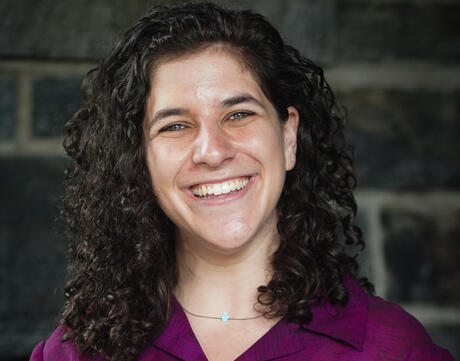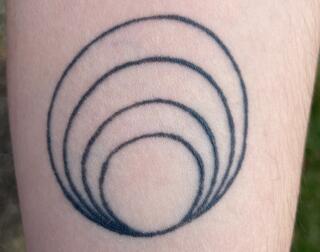
“The world is obligated to you and you are obligated to the world.”
Lucie Shiffman took a Facing History & Ourselves class in high school that opened up ideas of how communities can care for one another. Her Facing History experience was the start of a journey that inspired her college choices, her career choices, and her continued community actions. Lucie was kind enough to sit down with me and chat about what Facing History has meant to her—from introducing her to the Universe of Obligation to providing the opportunity to share difficult histories with a diverse group of people. And now, more than a decade after her Facing History class, she is still finding ways to stay involved with our organization and its mission.
Jessica Weingartner: When did you take Facing History?
Lucie Shiffman: I took Facing History & Ourselves, Human Rights and Conflict as a junior in high school, which would have been about ten years ago. It was an elective class and it was kind of competitive because they only taught it once a year and only 20 people were accepted into the class.
I'm the youngest of three and both of my older siblings had taken Human Rights and Conflict with our teacher Mr. Deagen and I had only ever heard good things about it. On top of that, my teacher for US history really urged me to sign up for the Facing History class—she said it would be good for me and that I’d love it. And I absolutely did.
I actually just met up with Mr. Deagan for coffee last week.
Jessica: We hear often from students who stay connected to Facing History teachers, and it’s so great to hear you’re still in touch with Mr. Deagan. In the Facing History class did you observe any transformative moments for yourself or your peers?
Lucie: I went to a Jewish day school before high school. And so in my Facing History class, it was the first time I started talking about things like the Holocaust with people who were not Jews, which was a really interesting perspective.
I remember our journal topics and talking about caring for others and how we decide who we're obligated to. That was really transformative for me personally. And I remember the “Choosing to Participate” projects that people in my class did. Those projects were an anchor point of that Facing History class at Beachwood High School.
Jessica: Can you speak to any ways that Facing History has influenced your life?
Lucie: I think the connection I have felt to discourse is a huge part of my life. I remember participating in Facing History teach-ins that were student-led with kids from all over Cleveland. We brought in Holocaust survivors and teachers. We taught and facilitated student conversations about difference and learning from lived experiences and things like that.
I knew these kinds of interactions were something really important to me. So when I was looking at colleges, I found a school in northwest Pennsylvania that had a Community and Justice Studies program. That was a key factor in me choosing what I wanted to do.
And then throughout college, I kept diving into the things that Facing History first showed me, like choosing to participate, thinking critically about community, what it looks like to be in community, and how to analyze our past and build a better future. I also did something called the Sustained Dialogue Institute, which I think is very similar to what I did in Facing History where we listen deeply enough to be changed by what we hear.
When I graduated college I went into the Peace Corp. I applied as a “where you’re needed” volunteer, which means they can place you anywhere in the world or any in any of their serving countries. I got placed in Rwanda, which is a country I had first learned about in my Facing History class when we covered the 1994 genocide against the Tutsis.
I remember being in Rwanda and being asked what it was like having my first exposure to this genocide, and when I replied that my first exposure was in high school, I realized that that was a very rare occurrence.

Lucie Shiffman designed her own "Universe of Obligation" tatoo.
Jessica: One of the reasons my colleagues and I wanted to interview you is because of how connected you are to the concept of the “universe of obligation.” Can you tell us more about what that means to you?
Lucie: In Judaism there's a big commitment to bearing witness and being a citizen who's aware of what's happening in the world. And so for me, the universe of obligation just builds off of that, where your goal in life shouldn’t only be to exist happily, it's to ensure communal safety. In high school I remember thinking that my universe of obligation wasn’t that big. It was my family and me in the center, then you zoom out and it's my classmates, my friends, and then you zoom out more and it's the larger community.
As I got older and I started learning about restorative justice and these things that people don't really talk about in high school, I thought, “Wow, when you think of a universe of obligation, if it just keeps expanding, that ends up including everyone.” That idea of an inclusive universe of obligation has had so much of an impact on me, that I actually designed my own version and have a tattoo of it. Like the Facing History version it has me at the center, but rather than just concentric circles, it’s designed to connect at the bottom to show that people can be moving in and out of the circles because the reality is that the world is obligated to you and you are obligated to the world.
Jessica: You’ve recently joined a young professionals Facing History group that's been formed in Cleveland. Can you tell me how you envision working in this group and how you think it expands the mission of Facing History?
Lucie: I'm excited to reconnect with folks who I felt helped me start on this journey of learning. I think it will be really great to just network with people who see the world in the same way. And I think folks who go through Facing History programs really have the experience and understanding of how to connect and build community. It's going to be a great opportunity to connect with folks who envision communities in the same way and know that we have to understand history and ourselves.
I'm someone who loves to learn for the sake of learning and fun. I think that people who find meaning in Facing History the same way I do are always going to be looking for that kind of connection. I'm really lucky that I found that and we're lucky to have folks who are willing to facilitate us through these conversations with students in school, and now with adult alumni like me.

